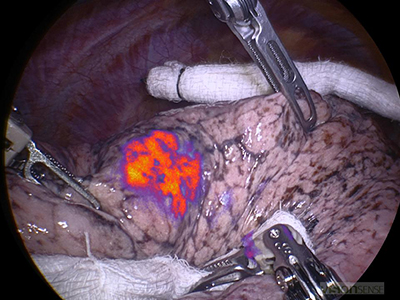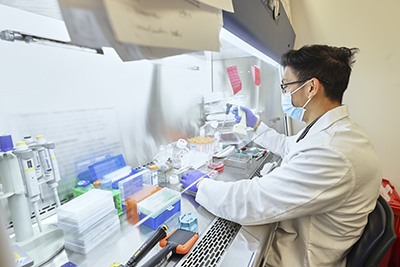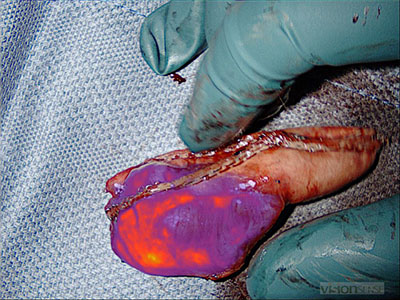Current Projects
Intraoperative Molecular Imaging
 Our laboratory is developing the next generation of intra-operative imaging techniques. We are aggressively pursuing multiple techniques and approaches to Intraoperative Imaging in the hopes of giving patients more complete resections of primary, micrometastatic, and lymphatic disease while minimizing unnecessary tissue reductions and shortening hospital stays. As part of the bench-to bedside-to-bench approach, we are heavily invested in both human and animal studies to optimize our procedures.
Our laboratory is developing the next generation of intra-operative imaging techniques. We are aggressively pursuing multiple techniques and approaches to Intraoperative Imaging in the hopes of giving patients more complete resections of primary, micrometastatic, and lymphatic disease while minimizing unnecessary tissue reductions and shortening hospital stays. As part of the bench-to bedside-to-bench approach, we are heavily invested in both human and animal studies to optimize our procedures.
Currently, our focus in intraoperative imaging is two-fold. Through our clinical arm, patients will be enrolled in our clinical trial in the hopes of identifying local and distal metastases with the use of our collaborator’s newly developed software, imaging system and commonly administered non-radioactive isotopes. Through the excitation of molecules in non-toxic chemicals, the malignancies previously undetectable to the surgeon in the operating room, will no longer pose a threat to patient health.
Secondly, our mouse modeling systems are examining multiple modalities of nanotechnology and small molecules, utilizing reagents at the forefront of surgical imaging technology. Specifically, we are developing and testing new near-infrared and visible contrast agents that can target tumors and allow them to fluoresce in the operating room. Center for Precision Surgery
Tumor Immunology
 Lung cancer is the leading cause of cancer in the United States today. Many patients present when their cancer is advanced and they cannot receive many therapies. Our goal is to cure patients with advanced disease by developing novel immunotherapies. These immunotherapies use one’s own immune system to “clean up” tumor cells in the body.
Lung cancer is the leading cause of cancer in the United States today. Many patients present when their cancer is advanced and they cannot receive many therapies. Our goal is to cure patients with advanced disease by developing novel immunotherapies. These immunotherapies use one’s own immune system to “clean up” tumor cells in the body.
The major area of recent interest in the lab is the augmentation of anti-tumor immune effects using several immune-modulators in combination with surgical techniques. The primary drive of the laboratory’s immunological approach lies in the augmentation of currently available surgical procedures with cancer vaccinations which will act to modulate and disrupt the tumor microenvironment and other immunosuppressive factors inherent in a cancer patient.
The characterization of tumor microenvironment in cancer patients is still in its infancy and the functional crosstalk between immune and tumor cells in humans remains unexplored. Our research interests are directed toward understanding the specific functional and regulatory roles of distinct subsets of tumor-infiltrating neutrophils and macrophages in patients with lung cancer
Muscle Physiology
 Approximately 33% of all adult patients admitted to an intensive care unit require mechanical ventilation (MV); therefore, over 300,000 adult patients receive MV annually in the United States. Failure to wean patients from MV is an important clinical problem because increased time on the ventilator increases ventilator-associated complications and mortality. The Respiratory Muscle Research Laboratory, co-directed by Drs. Sanford Levine and Sunil Singhal, utilizes a translational research approach to elucidate the cellular and molecular remodeling of the respiratory muscles that are associated with pulmonary diseases and disorders (e.g., COPD, patients undergoing mechanical ventilation). Our approach is to elucidate this remodeling by utilizing state-of-the-art molecular biological techniques on respiratory muscle biopsies obtained from patients whose disease states have been fully characterized by clinical, radiological and laboratory studies. Within the past several years, findings by this lab have altered the therapeutic paradigms for patients with severe COPD as well as for patients undergoing mechanical ventilation for prolonged periods of time.
Approximately 33% of all adult patients admitted to an intensive care unit require mechanical ventilation (MV); therefore, over 300,000 adult patients receive MV annually in the United States. Failure to wean patients from MV is an important clinical problem because increased time on the ventilator increases ventilator-associated complications and mortality. The Respiratory Muscle Research Laboratory, co-directed by Drs. Sanford Levine and Sunil Singhal, utilizes a translational research approach to elucidate the cellular and molecular remodeling of the respiratory muscles that are associated with pulmonary diseases and disorders (e.g., COPD, patients undergoing mechanical ventilation). Our approach is to elucidate this remodeling by utilizing state-of-the-art molecular biological techniques on respiratory muscle biopsies obtained from patients whose disease states have been fully characterized by clinical, radiological and laboratory studies. Within the past several years, findings by this lab have altered the therapeutic paradigms for patients with severe COPD as well as for patients undergoing mechanical ventilation for prolonged periods of time.

